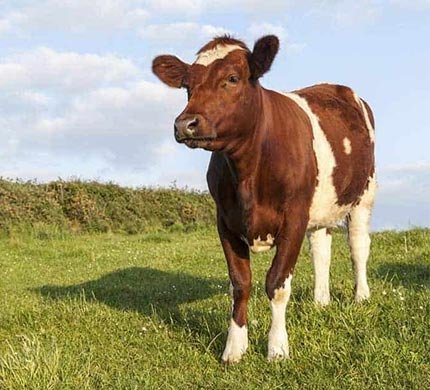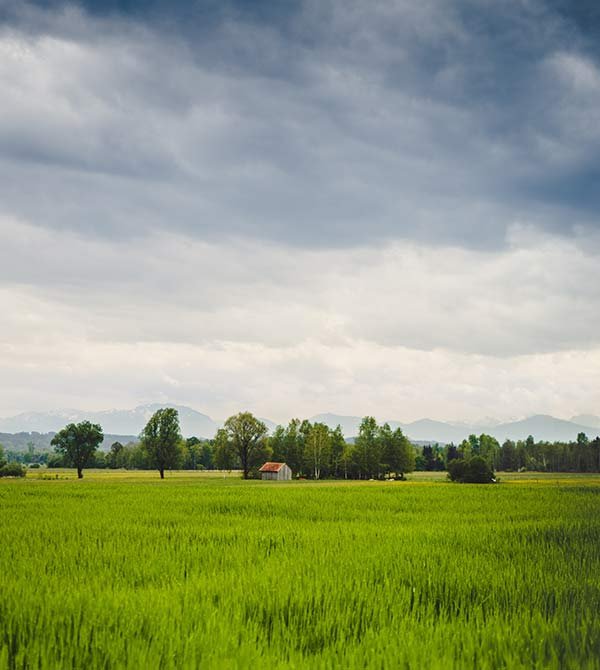Ayrshire
- Temperature:Cold
- Milk:Around 17,000 pounds per year
- Food:Hay, silage and grains
- Pregnancy:Around 280-290 days
- Nationality:US, Canada and Australia

General Information
Ayrshire cattle are a breed of dairy cattle that originated in Scotland. They are medium-sized cattle with distinctive red and white markings, including a white face and legs. Ayrshire cows are known for their high milk production, with an average yield of around 17,000 pounds of milk per year. The milk has a high butterfat content, making it suitable for cheese and butter production.
They are hardy and adaptable to a range of climates, although they are best suited to cooler environments. They are primarily fed on a diet of hay, silage, and grains, and require proper nutrition and veterinary care to maintain their health and productivity.
They are raised in many countries around the world, including the United States, Canada, and Australia, and are valued for their high-quality milk and contributions to the dairy industry.
Where we find this cow to buy?
Ayrshire cows can be purchased from various sources, including breeders, livestock auctions, and online marketplaces. Here are some ways to find Ayrshire cows for sale:
01. Check with Ayrshire breed associations: The Ayrshire Breeders' Association or Ayrshire Cattle Society may have a list of breeders who are selling Ayrshire cows.02. Visit livestock auctions: You can attend livestock auctions in your area to see if there are any Ayrshire cows available for purchase.03. Online marketplaces: Websites like Craigslist, Facebook Marketplace, or Hoobly often have listings of Ayrshire cows for sale.04. Contact local dairy farms: If there are dairy farms in your area that raise Ayrshire cows, you can inquire if they have any cows for sale.

How to increase milk production in Ayrshire?
There are several ways to increase milk production in Ayrshire cows:
01
Ayrshire cows need a diet that is high in fiber, energy, and protein to support their milk production. Make sure to provide them with high-quality hay, silage, and a well-balanced grain mix.
02
It’s essential to provide clean and fresh water to Ayrshire cows at all times. They require plenty of water to maintain their milk production.
03
This includes ensuring cows have comfortable housing and bedding, regular veterinary check-ups, and proper milking procedures.
04
Some farmers use growth hormones to stimulate milk production in their cows. However, this should only be done under the guidance of a veterinarian and in compliance with local regulations.
Medicine
There are several types of medicine that may be used for Ayrshire cattle, depending on their specific health needs. Here are some examples:
01
AntibioticsThese are used to treat bacterial infections in cattle, such as respiratory infections, mastitis, or foot rot.
02
AnthelminticsThese are used to treat internal parasites, such as roundworms, that can cause health problems in cattle.
03
Anti-inflammatory DrugsThese are used to reduce inflammation and pain in cattle, such as in cases of joint inflammation or fever.
04
VaccinesThese are used to prevent certain diseases in cattle by boosting their immune system’s ability to fight off infection.
Pregnancy
Ayrshire cattle, like all cattle breeds, have a typical pregnancy that lasts approximately 283 days (or around 9 months). During pregnancy, Ayrshire cows require proper nutrition and management to support the growth and development of the fetus, ensure a healthy delivery, and promote the cow’s own health and well-being.
There are several stages of pregnancy in Ayrshire cattle, which include:
01
Early PregnancyDuring the first trimester of pregnancy, the fetus is developing rapidly, and the cow’s nutritional requirements may increase slightly to support this growth.
02
Mid-pregnancyDuring the second trimester, the fetus continues to grow, and the cow’s nutritional requirements increase further to support this growth. The cow may also start to show physical signs of pregnancy, such as a larger abdomen or udder.
03
Late PregnancyDuring the third trimester, the fetus is fully developed and the cow’s nutritional requirements are at their highest to support the calf’s birth weight and the cow’s own health.
04
Parturition (calving)Labor and delivery typically last several hours and require proper management to ensure a safe and healthy birth for both the calf and the cow.
Important!
Proper management during pregnancy includes providing adequate nutrition, appropriate vaccinations, and regular veterinary check-ups to monitor the cow’s health and the fetus’s development. It is also important to provide a clean and comfortable environment for the cow to reduce stress and promote good health.
Food
Ayrshire cattle, like all cattle breeds, have specific nutritional requirements to maintain their health and productivity. Providing proper nutrition is essential for the growth and development of young calves, milk production in lactating cows, and maintaining body condition in adult animals. The following are some common types of food that Ayrshire cattle may consume:
Forage, such as pasture grass, hay, or silage, provides a significant portion of the diet for Ayrshire cattle. Forage is high in fiber and other nutrients, and it helps maintain rumen health and digestive function in cattle.
Concentrates, such as grain or soybean meal, provide a concentrated source of energy, protein, and other nutrients. These are typically fed to lactating cows to support milk production or to growing calves to support growth and development.
Ayrshire cattle require specific minerals and vitamins in their diet, such as calcium, phosphorus, and vitamin D, to support bone growth and development and overall health.
Access to clean, fresh water is essential for Ayrshire cattle to maintain hydration, body temperature, and normal bodily functions.
Facts
Here are some interesting facts about Ayrshire:
Ayrshire is a breed of dairy cattle that originated in Scotland in the 18th century.
They are known for their hardiness and adaptability to a wide range of climates and conditions.
Ayrshire cows are medium-sized, with a typical weight range of 450-700 kg for cows and 600-1000 kg for bulls.
They are known for their high milk production, with an average production of 20-25 liters of milk per day.
Ayrshire milk is high in protein and butterfat, making it ideal for cheese and butter production.
They are often used in crossbreeding programs to improve the milk production.
They have a calm and docile temperament, making them easy to handle and work with.
They have a calm and docile temperament, making them easy to handle and work with.